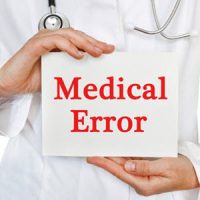When Do Medical “Errors” Become Medical Malpractice?

Medical errors happen on a much wider scale than the average person thinks. Studies are varied in terms of how many patients experience “preventable harm” per year, from 100,000 to over 400,000, but suffice it to say, there is an ongoing problem with patients suffering preventable harm that can cause serious consequences. That said, it is important to understand that not every medical error rises to the level of medical malpractice. Under Florida law, the alleged actions (or lack thereof) of the medical professional in your case will be the ultimate factor that decides whether you have a claim or not.
Establishing Malpractice Is Difficult
In order to mount a successful medical malpractice claim in Florida, there are several hoops one must jump through in order to even be permitted to send notice of intent to file. The claimant (meaning, the injured patient) must conduct what the law calls a ‘presuit investigation,’ to “ascertain that there are reasonable grounds” to show that a specific medical professional or entity was negligent in administering medical care, and that the negligence caused harm to the injured patient. As a part of this ‘investigation,’ the injured patient must specifically include a ‘verified written medical expert opinion’ which confirms their claim is valid.
Once you are cleared to file suit, you must establish certain major criteria in order to have a chance of prevailing. You must establish the standard of care owed by the medical professional or entity (such as a hospital), and show that it was breached, which can be a very subjective undertaking. You must also be able to show that the breach of the standard of care caused your injuries, and to quantify your injuries if at all possible. These are not easy factors to establish, but doing so is not impossible.
Sometimes Medical Malpractice Claims Do Not Exist
While the required presuit investigation into alleged claims of medical malpractice may seem very cumbersome and frustrating, it does help to establish which claims truly amount to malpractice and which are mere medical errors. In theory, any medical error is a breach of the standard of care, but if the error does not directly cause harm to the patient, no grounds for a claim exist. In other words, all of the criteria for a medical malpractice lawsuit must be present before one can be mounted – if you have a medical mistake, but no tangible injury, no claim exists to bring.
Alternatively, it is important to keep in mind that sometimes, bad results simply happen. The mere existence of a poor result after surgery or another procedure does not immediately imply negligence on the part of a doctor or other medical professional – in other words, sometimes doctors do everything right and a patient may still die or suffer. It may give a suffering family some sense of control to try and blame doctors for a poor result, but sometimes the accusation is simply not warranted.
Contact A Tampa Medical Malpractice Attorney
Experiencing medical errors or bad results can be demoralizing, particularly when you are the one who is suffering. However, it is important to be aware that some bad results are not actionable; wasting your time and money can only make your situation more difficult to deal with. If you have questions about a potential claim, the Tampa medical malpractice attorneys at the Rinaldo Law Group will give you honest, compassionate answers and work hard to represent you properly. Contact our offices today for a free consultation.
Resource:
pubmed.ncbi.nlm.nih.gov/28186008/
